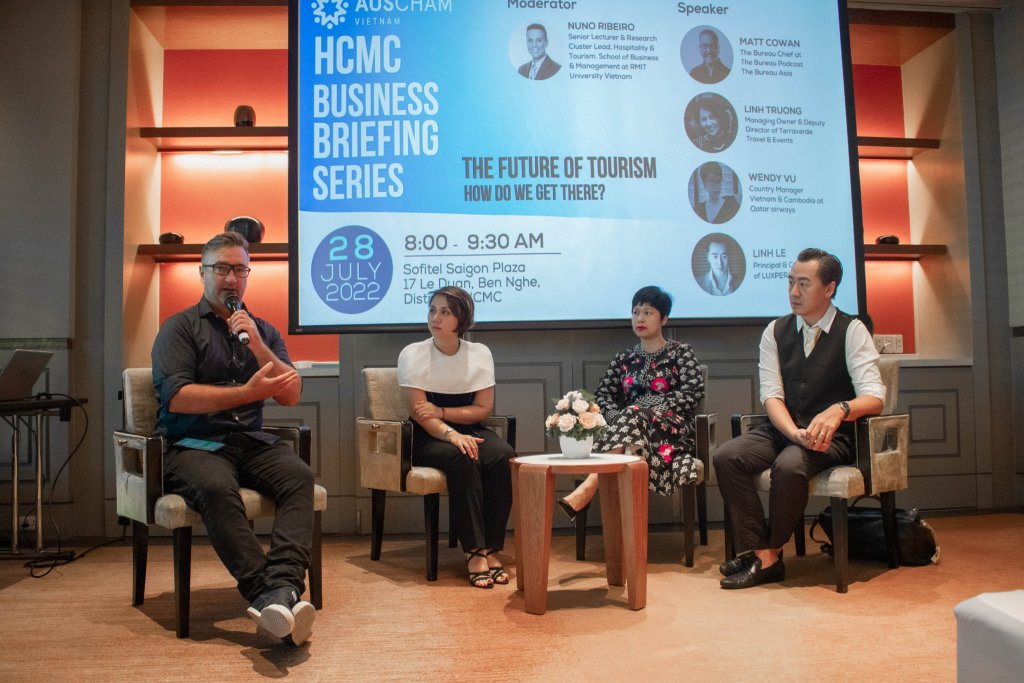
Travel and tourism experts warn the Vietnam tourist visa approval process along with staff shortages in the travel industry are damaging for Vietnam as a holiday destination
Attendees at the Australian Chamber of Commerce’s July Business Briefing Breakfast held at the Sofitel Saigon Plaza in Ho Chi Minh City have been told “Vietnam is still shutting the door on international tourists.”
Speaking as a panelist at the Chamber’s monthly breakfast briefing series in front of a large gathering, Wendy Vu, Country Manager for Vietnam and Cambodia at Qatar Airways, expressed not just her frustration, but that of Vietnam’s travel industry at large, with the cumbersome and restrictive visa approval process hampering the recovery of international travel here.
There are grave concerns within the industry for Vietnam as an international tourism brand moving forward
“For many European travelers at the moment, they’re only allowed to stay up to 14 or 15 days. Do you think this helps Vietnam? No,” said Ms Vu, who also highlighted that while neighboring Southeast Asian countries are easing travel restrictions, Vietnam is overcomplicating things, which in effect is giving many international tourists no other option but to travel elsewhere.
“The reason why you don’t see many international tourists here at the moment is because so many of them have canceled their trips to Vietnam – they just couldn’t make it to Vietnam (due to the visa approval process),” she said.

Vietnam has an ambitious plan to welcome five million international tourists by year’s end, however, that figure may have to be revised down after the Ministry of Culture, Sports & Tourism reported on its official website in June that in the first five months of this year, there were just 365,000 arrivals from abroad.
In addition, anecdotal evidence provided by the panelists during AusCham’s monthly event suggests international tourist arrivals won’t reach anywhere near the five million target.
Panelist Linh Le, principal and co-founder of Luxperia DMC Collective, a boutique luxury travel agency based in Ho Chi Minh City, was upbeat however with his assessment for the year in travel.
“We’re in a year where the industry is in recovery,” he said when asked what can be done in the immediate future to take tourism in Vietnam to the next level. “What I’m finding is the recovery hasn’t been as fast as one would’ve hoped for, but the good news is that the domestic market is something that has truly saved the industry here in Vietnam. From an international point of view, it certainly is coming back, but we have macroeconomic and geopolitical issues here and around the world to consider. I’m very optimistic that by 2023, it’s going to be our true year of return in Vietnam.”

Although Vietnam has been praised internationally for its efforts in managing its response to the Covid-19 pandemic over the past two and half years, the travel industry is desperate for authorities here to tackle international tourism with similar urgency.
“A lot of DMCs (Destination Management Companies) are actually appealing for help,” explained Ms Vu, who believes travel won’t fully resume until at least the end of 2023 or even into early 2024. “They just can’t do business, they can’t undertake long-term planning and promote Vietnam as a country of love, hospitality and beauty simply because their hands are tied.”
Nevertheless, even if Vietnam were to change its policy on tourist visas, there’s serious concern as to whether the industry can actually handle a sudden influx of international travelers anyway.
According to panel moderator, Dr Nuno Ribeiro, a senior lecturer and research cluster lead in hospitality and tourism management within the School of Business and Management at RMIT Vietnam, tourism pre-pandemic represented in the vicinity of 11% – 14% of Vietnam’s GDP, while approximately one in every 11 jobs was either directly or indirectly related to tourism.
However, from the onset of the pandemic, those jobs suddenly disappeared leaving people to look for employment elsewhere, exposing them to other industries and career pathways in the meantime.

As a result, many haven’t returned as borders have reopened due to various reasons, among them disillusionment with the travel industry and simply because they are content in the new careers they have discovered.
This has left a gaping hole across the country desperately needing to be filled, not necessarily with experienced talent, although that’s preferable, but rather by anyone willing to take a shot at either a short-term or long-term career in hospitality and tourism.
Already this is causing issues as Vietnam’s domestic tourism booms, leaving airports, airlines, hotels and resorts sorely understaffed, in turn leading to delays and a severe decline in service quality, which some say are sure signs of cracks appearing in “Brand Vietnam”. There are grave concerns within the industry for Vietnam as an international tourism brand moving forward.
While on one hand some industry insiders say the shortage in staff is the most concerning aspect of the future of tourism in Vietnam, others see the issue as being deeper than simply finding and training up staff.
They argue it’s the country’s propensity for offering a lot of “average product for average people” causing harm, along with the seemingly unceasing construction of mega resorts with rows of meaningless shophouses that have no relevance to Vietnam’s brand.

Then there is the issue of sustainable tourism.
Vietnam has for some time been saddled with an unsavory reputation in relation to its sustainable development.
In 2020, Vietnam ranked an abysmal 96 out of 99 in Euromonitor’s Sustainable Travel Index, which measured indicators such as health, impact of travel on the local environment, and the general state of tourism in a country.
The same report highlighted Vietnam’s poor ranking of 88 out of 99 countries in relation to the measurement of sustainable tourism demand.
With this in mind, panelist Linh Truong, co-founder and deputy director of Terraverde Travel & Events, a Vietnam-based travel company that promotes responsible travel and who has invested in the likes of electric bicycles for their tours, acknowledged Vietnam’s situation.
“Vietnam is struggling with plastic and it’s a pressing issue that needs to be addressed soon,” she said. “Sustainability should be addressed from the top down in terms of policy making, education and waste management.”
Linh Le agreed with Ms Truong: “It’s something that needs to be holistic. It’s not just about the tourism industry or operators to fix the problem, it should involve education in the school system, and from an individual business owner’s point of view, it starts with me. I think it’s very important that we educate, but also understand how people like me can influence and help my team learn so that they can influence their networks.”
Indeed, this will prove to be yet another challenge for the industry in a country where the concept of sustainable travel among young generations of Vietnamese is either poorly understood or simply unknown.
——
Follow The Bureau Asia
Facebook | Instagram | YouTube | Linkedin | Twitter
Follow the author
All rights reserved ©The Bureau Asia
If you see this content reproduced in any shape or form anywhere other than on thebureauasia.com, then it has been used without our permission


